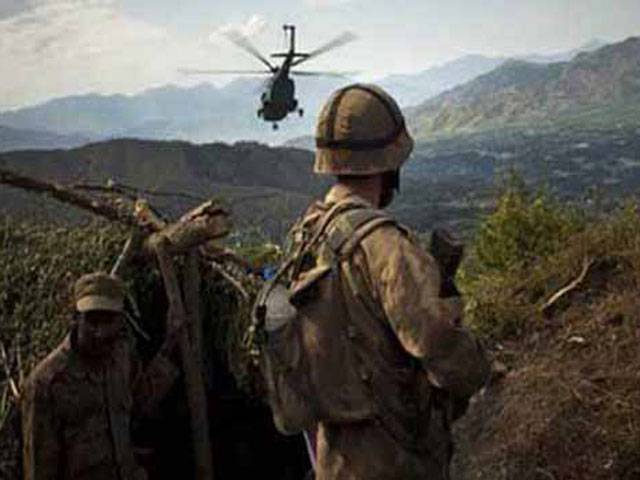LAHORE - The foreign sponsored terror in the country appears to have been the deadliest so far this year. The significant success of Zarb-e-Azb does not mean the war on terror is over. The country will have to fight both “homegrown and foreign sponsored” militancy for several years to come, and take sweeping steps on war-footing to change the extremist mindset.
This was an upshot of background interviews with senior police officers, counter-terror officials and some security experts - including a few retired personnel. They spoke to The Nation at length and preferred their names not be mentioned since they were not authorised to speak on the subject because of security and political considerations.
Security experts say they believe there was a paradigm shift in the war on terror with regard to appalling developments taking place in the Middle East, Europe, Africa and South Asia. The terror groups like Taliban, ISIS, Boko Haram, al-Qaeda, and al-Shabbab, have become more lethal.
Pakistan has been facing multiple challenges on the internal and external fronts. The foreign-funded militancy is emerging as the most serious threat to the country as compared to religious, ethnic, and sectarian terrorism.
Some 500 to 600 Pakistanis were fighting in Syria and Iraq, according to a security official. Many of them are now returning after coalition forces gains against ISIS (Islamic State of Iraq and Syria), creating a new security challenge to Pakistan as these poisoned minds and trained hands are quite capable of making the sanitation even more explosive.
Also known as ISIL and Daesh, ISIS has significant presence in Libiya and Afghanistan too. This is the most lethal and brutal group has been masterminding and perpetrating gun, bomb and explosive-laden truck blasts in various parts of the world including Europe, Turkey and Pakistan.
Senior government officials deny the presence of ISIS in the country, although authorities confirm that a few families went missing from Punjab districts in the recent past and they could be present in Iraq and Syria.
Lashkar-e-Jhangvi chief Malik Ishaq, his two sons and 11 followers were killed in a shootout with police. Reportedly, Ishaq had developed links with the ISIS group. Following the killing of the hard-line cleric and his followers, Punjab Home Minister Col Shujaa Khanzada was assassinated in a suicide attack in his hometown. An offshoot of the Pakistani Taliban had claimed responsibility of the attack, calling it a revenge for the killing of Malik Ishaq.
An official told The Nation yesterday that some suspects were detained by intelligence agencies shortly after they landed at different airports. “A few are on the radar of intelligence operatives.” The counter-terror official said the information that “some 500 to 600 Pakistanis are fighting in Syria and Iraq” is based on a credible intelligence assessment. “Not sure, how many have been arrested on their return. However, some of those arrested have given vital information.”
Another source familiar with the developments said airports are put on high alert and “special measures are being taken on war footing” to intercept and arrest such elements.
The move comes days after a terror strike at a Quetta hospital killed more than 70 people. Jamaat-ul-Ahrar, an offshoot of the Pakistani Taliban having links with ISIS, claimed the responsibility for the attack targeting lawyers and journalists.
The same group was behind the deadliest attack in the country so far this year; the suicide attack in a crowded Lahore park that killed 75 people on Easter Sunday in March. After claiming responsibility for the Gulshan-i-Iqbal park blast, the Jamaat-ul-Ahrar declared the start of a new terror campaign, “Sound of Thunder”.
The group posted an Urdu communiqué on its Facebook page early this year claiming that Christians were the prime target. The post also carried a photo of the bomber, identifying him as Salahuddin Khorasani.
Security experts say they believe the Quetta blast was identical to Lahore attack. “The modus operandi was the same. Again, they selected a soft target. They used lethal combination (of explosives) to inflict maximum casualties.”
As the nation of 20 million people is preparing for Independence Day celebrations amid serious terror threats, law enforcement and intelligence agencies are on their toes to ensure foolproof security on this occasion.
The terror groups like Taliban, Lashkar-e-Jhangvi, Jamaat-ul-Ahrar, Jandullah and ISIS launch coordinated attacks. “Unfortunately, we lack proper coordination. Our intelligence and law enforcement agencies, military and paramilitary forces should develop a full-fledged mechanism to boost liaison and coordination to defeat and destroy extremism and terrorism,” an expert said.
Experts warned that the authorities must develop a mechanism to identify, intercept and capture the Afghanistan trained boys, those returning from Syria and Iraq war and the sleeper cells of militant groups.
They believe there is no soft and quick solution to the problem and the country will have to fight for another decade or two not only to quell militancy but also to change the mindset that keeps nurturing and perpetuation terrorism.
Only, the registration of Madrassas is not enough. The government must do something to counter the brainwashing. The graduates of religious schools should be given job opportunities and the syllabus should be reformed. Similarly, the prayer leaders should be employed by the government and a standardised sermon should be approved for all mosques across the country. The government should also take some steps to win the confidence of religious circles.
While the intelligence-based operation needed to be intensified, the government should work on war-footing to introduce social, economic and education reforms. The local facilitators and supporters of terror network should be exposed and brought to justice.
The criminal justice system also needs some fundamental changes. The judges hearing terrorism cases should be faceless while the identity of the witnesses, investigators and lawyers should also be completely hidden, and they all should be provided foolproof security. The capacity building of prosecutors and investigators is also essential.
Related stories on pages 2&3






